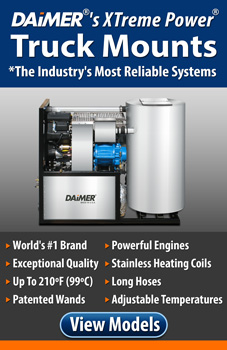
Tri-mode pressure washers offer a variety of advantages over other pressure washing equipment. Because of their advantageous versatility and cleaning power, many professionals choose tri-mode machines, enabling them to complete a wide range of job applications include auto detailing, degreasing, and equipment cleaning.
What Are Tri-mode Machines?
Conventional pressure washers provide only one or two kinds of output: heated and non-heated. Hot water output can reach a maximum of 210°F, while non-heated machines disperse water at room temperature or inlet temperature. Tri-mode machines, on the other hand, can provide three types of output: cold water, hot water, and steam. The added advantage of steam temperatures up to 330°F helps soften stains created by dirt and grease.
For added cleaning power, tri-mode machines by Daimer® are offered with pressure levels up to 3500 psi. This enables operators to soften the most challenging deposits while blasting them away with high powered output. For lighter applications or for cleaning heat-sensitive surfaces, cold water and hot water modes can also be used. This versatility ensures the right level of output for virtually all applications.
Advantages
What Are Tri-mode Machines?
Conventional pressure washers provide only one or two kinds of output: heated and non-heated. Hot water output can reach a maximum of 210°F, while non-heated machines disperse water at room temperature or inlet temperature. Tri-mode machines, on the other hand, can provide three types of output: cold water, hot water, and steam. The added advantage of steam temperatures up to 330°F helps soften stains created by dirt and grease.
For added cleaning power, tri-mode machines by Daimer® are offered with pressure levels up to 3500 psi. This enables operators to soften the most challenging deposits while blasting them away with high powered output. For lighter applications or for cleaning heat-sensitive surfaces, cold water and hot water modes can also be used. This versatility ensures the right level of output for virtually all applications.
Advantages
The main advantage of tri-mode pressure washers is their versatility. One such machine, Daimer®’s Super Max™ 15200, includes tri-mode capabilities along with pressure levels of 1000 psi and a flow rate of 2 GPM. This machine is ideal for auto detailing, cleaning factory floors, and cleaning other hard surfaces in areas where mobility isn't necessary, as this machine is stationary. However, utilizing Daimer®’s Long Hose Technology, operators of this stationary pressure cleaner can reach areas up to 300 feet away. Optional multi-gun operation enables two people to use the pressure washer at the same time to quicken the cleaning process.
























